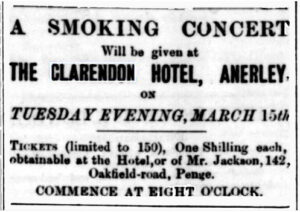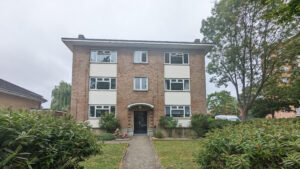The first Crystal Palace FC held their annual supper at the Clarendon Hotel, Anerley, on February 27, 1869.
It was originally called the City of London Hotel and Tavern and was one of just a few hotels in the area at the time the Crystal Palace arrived in 1854.
The establishment was taken over by landlord John Porter in 1866 who renamed it the Clarendon Hotel.
Around 30 members from the Palace squad met up at the Clarendon after the final home fixture of the season between the ‘Over 23s’ and the ‘Unders’ at Crystal Palace Park.
Alex Morten’s ‘Overs’ won 4-0 but Charlie Harvey’s ‘Unders’ were missing several players who appeared for Kent v Surrey that day.
The club came back in February 1872 for their annual supper under the hotel’s new proprietor Mr Sampson.
That day, there was a ‘Captain’s Eleven’ versus the ‘Rest of the Club’ – who mustered 23 players! The latter made their numbers count and were victorious 2-1.
In the evening, there was a special presentation made to Douglas Allport who had been secretary, treasurer and captain for many years.
Palace chairman Walter Franks presented Allport with a table centrepiece and elegant drawing room clock.
The Norwood News & Crystal Palace Chronicle reported on the evening.
In his speech, Allport said: “He felt their generosity the more, as he had probably had more enjoyment out of the Club than any other player; and considered himself more than repaid for what work he did by the honour and pleasure it was to be the captain of such gentlemen and good players as members of the Crystal Palace Football Club (great cheering).”
 Also present was the FA’s honorary secretary and treasurer, Charles Alcock, and he also gave a speech. He was captain of the Wanderers but made guest appearances for Palace as he lived locally in Dulwich.
Also present was the FA’s honorary secretary and treasurer, Charles Alcock, and he also gave a speech. He was captain of the Wanderers but made guest appearances for Palace as he lived locally in Dulwich.
Alcock devised the FA Cup and was the first winning captain in 1872 with the Wanderers. He also organised the first international match when England played Scotland that year.
The report continued: “Mr CW Alcock, who was much cheered, replied. The health of ‘The Ladies’ of Mr WG Stainburn, the promoter of the testimonial, of Mr A Morten, the Deputy-captain, and of the Chairman having been drunk, and a variety of capital songs sung, the party broke up at half-past 11 o’clock.”
The hotel had grand entrances, a bar parlour, large assembly room and private rooms, coffee rooms, plus bedrooms and offices.
At the rear was a large enclosed area, approached by a lofty arched gateway, with stabling and loose boxes for 20-30 horses, several large double carriage-houses, harness rooms and lofts.
The establishment was regarded as less pretentious than many others of its kind but well appointed with good comfort and value.
Though the proprietors were not always on the right side of the law. In September 1854, Thomas Brown was charged under the new Beer Bill for unlawfully keeping his pub open on Sunday between 2.30pm and 6pm not being sold to bona fide travellers or lodgers.
When the Crystal Palace or ‘Sydenham Palace’ opened that year in 1854, the City of London Hotel was not the only accommodation on offer. The Crystal Palace Hotel and the Beulah Spa Hotel were owned by the same businessman, while the Anerley Hotel and the Holly-bush at the top of Norwood Hill were also available for overnight guests.
A sense of community among local landlords was evident in January 1863, when Mr Fenton of the City of London Hotel and Mr Handford of the White Swan, organised a group pigeon shooting match. It was held on land close to Anerley station and the marksmen tucked into a “first-rate spread” and enjoyed “a festive and harmonious evening” at the City of London Hotel afterwards.
In June 1867, landlord Porter was honoured with a dinner by some old friends and also some new ones in the area. He was previously the proprietor of the Star and Garter, in Kew Bridge, and chef de cuisine at the Grand Hotel, in Brighton.
After dinner, a toast was given to “The health of Mr Porter and success to the Clarendon.” Pioneering aeronaut and writer Henry Tracey Coxwell was among the guests present.
The Aeronauts is an Amazon-produced film of Coxwell’s spectacular 1862 balloon ascent with the meteorologist James Glaisher to an altitude higher than Everest’s peak. However, the streaming company deleted Coxwell and replaced him with the fictional Amelia Wren, played by Felicity Jones.
 A Clarendon Hotel advert in John Bull, June 29, 1867
A Clarendon Hotel advert in John Bull, June 29, 1867
The relationship between the hotel and the Crystal Palace Brewery (located behind it) turned sour after a dispute between new hotel owner Mr Sampson and Mr Billing from the brewery over unpaid barrels of beer which ended up in court in May 1872.
In May 1875 Arthur Ransby, landlord of the Clarendon Hotel, appeared in court. He was charged over two instances of “permitting drunkenness in his house… and also for having his house open during prohibited hours for the consumption of intoxicating liquors.”
 He was fined 11s in each case but the Bench decided not to endorse the convictions on his licence as it was his first offence.
He was fined 11s in each case but the Bench decided not to endorse the convictions on his licence as it was his first offence.
Billiards was popular in the Victorian period and the Clarendon Hotel contained a billiards room. In February 1872, the French champion billiard player Mr Izar competed with Mr Grant at the hotel.
While Grant played with a cue, Izar drew much amusement by playing with his thumb and finger only. Despite giving Grant a 150-point head start, Izar was victorious.
Grant was a billiard marker at the hotel whose job was to keep score of the game and the drinks fresh. In February 1873, he had a benefit match against a Mr Collins and friends and enthusiasts of the cue sport were invited to buy tickets to support him.
 Sydenham, Forest Hill & Penge Gazette, February 22, 1873
Sydenham, Forest Hill & Penge Gazette, February 22, 1873
 Sydenham, Forest Hill & Penge Gazette, March 12, 1881
Sydenham, Forest Hill & Penge Gazette, March 12, 1881
Global events were of interest to the locals in September 1876, as a meeting of the inhabitants of Penge, Anerley and surrounding district was held at the hotel for the purpose of protesting against the atrocities of Turkish troops in Bulgaria.
It was to gauge a feeling on how to influence the government to take some steps on the matter. Walter Franks – the chairman of CPFC – was present.
A number of other meetings were held at the Clarendon Hotel over the years. These included the Penge and Upper Norwood Conservative Association, debating fair trade v free trade (1881, 1874); a dinner of the Crystal Palace branch of the Amalgamated Society of Railway Servants (1879); and a dinner for Penge Cricket Club (1878).
There was also an auction of oak timber trees (1857), a furniture sale (1863) and a local residents’ meeting (1863).
 Wellington Gazette and Military Chronicle, December 15, 1878
Wellington Gazette and Military Chronicle, December 15, 1878
 Sydenham, Forest Hill & Penge Gazette, November 5, 1881
Sydenham, Forest Hill & Penge Gazette, November 5, 1881
In May 1877, Walter Davenport was the proprietor. An advert in the Norwood News read: “This old-established and first-class Hotel having changed hands has been entirely re-furnished and decorated, and is replete with every modern convenience for the comfort of visitors.
“Situated close to Palace and Anerley railway stations… It is a most convenient residence for families and gentlemen from the country visiting London, either on pleasure or business.
“It commands extensive views of some of the loveliest scenery in England, and contains private and public dining and billiards rooms, and ball and other rooms for public meetings, and a ladies’ coffee room. The cuisine and wines are of first rate quality.”
In the mid 1870s, a lady called Mademoiselle Gierre put on strength exercise classes for the nobility and gentry of Norwood. Known as New Spanish Calisthenic Exercises, it was etiquette lessons on improving grace of movement.
 The hotel and brewery did not survive the Second World War as Anerley suffered a substantial number of enemy airstrikes. Post-war, the Clarendon Hotel was replaced by a small block of flats called Clarendon House, named after the grand hotel, on Anerley Road (junction with Madeline Road).
The hotel and brewery did not survive the Second World War as Anerley suffered a substantial number of enemy airstrikes. Post-war, the Clarendon Hotel was replaced by a small block of flats called Clarendon House, named after the grand hotel, on Anerley Road (junction with Madeline Road).
Crystal Palace player Wickham Noakes ran the Bermondsey-based Black Eagle Brewery and traded as ‘Day, Noakes & Sons’ with teammate Frank Day.
There were more than 100 Noakes & Co pubs all over London. Noakes was the CPFC treasurer and Day was the club secretary who was at the first meeting of the Football Association in October 1863.
